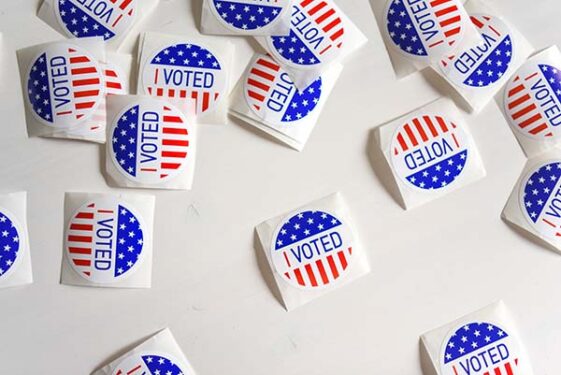
PROSPECT HEIGHTS — The question of whether citizenship should be a requirement to vote is headed for state court, now that a group of Republican lawmakers has sued to stop New York City from implementing a law permitting noncitizens to cast ballots in municipal elections.
The GOP officials, including Congresswoman Nicole Malliotakis, filed suit in New York State Supreme Court on Staten Island on Jan. 10 charging that the “Our City, Our Vote” law approved by the city council in December violates the State Constitution.
“The State Constitution and election law is very clear that only citizens are eligible to vote in our elections. Allowing noncitizens to vote dilutes the voice of citizens,” said Malliotakis, whose congressional district includes Staten Island and parts of southwest Brooklyn.
The lawsuit was filed against Mayor Eric Adams in his official capacity as mayor of New York, the city council, and the Board of Elections. The mayor did not sign the bill but he also did not veto it, thus enabling it to become law.
“The administration intends to vigorously defend the law in court,” said José Bayona, a spokesperson for City Hall.
Under the new law, people who are not citizens of the U.S. but who are Green Card holders, have work permits, or are recipients of the Deferred Action for Childhood Arrivals (DACA) program would be eligible to vote in city elections providing they have lived in the city for at least 30 days prior to the election.
The law opens up voting booths to an estimated 800,000 New Yorkers. The first municipal election under “Our City, Our Vote” would take place in 2023.
But city council Minority Leader, Republican Joseph Borelli, who is a plaintiff, urged residents to read the state’s election law to “fully grasp how their city government willfully violates the law without regard.”
While the state constitution doesn’t specifically contain language prohibiting noncitizens from voting, “it talks about citizens voting,” said Jerry Kassar, chairman of the New York State Conservative Party. “And by ‘citizens voting’ I don’t think they were thinking about noncitizens voting.
Adams, who initially expressed reservations about “Our City, Our Vote” — particularly with the short, 30-day residency requirement — now supports the law, saying in a statement that he believes in “bringing millions more into the democratic process.”
“I believe that New Yorkers should have a say in their government, which is why I have and will continue to support this important legislation,” said Adams.
Malliotakis also blasted the eligibility requirements, saying: “Wanting to give citizens of other countries the ability to vote in our elections after merely living in New York City for 30 days is really outrageous.”
It’s also a slap in the face to naturalized U.S. citizens, according to Malliotakis: “We have immigrants who went through the process; waited to become a United States citizen. And they’re so honored to have the privilege of voting rights.”
In addition to the Republican lawmakers, the lawsuit’s plaintiffs include five naturalized citizens, including Veralia Malliotakis, the congresswoman’s mother, who came to the U.S. from Cuba in 1959.
The new law enjoys support from immigrant advocacy groups who said it’s only fair to allow people who work and pay taxes in New York City to vote in local elections.
Murad Awawdeh, executive director of the New York Immigration Coalition, called the lawsuit baseless. “The Our City, Our Vote law ensures that NYC has the most inclusive democracy in the entire nation by allowing New Yorkers — who live here, raise children here, and give back to our neighborhoods in countless ways — to have a say in the direction of our city,” Awawdeh said.
The law applies only to city elections such as mayor, comptroller, public advocate, and city council members. Noncitizens would still be ineligible to vote for president of the U.S. or other federal or statewide offices.
Noncitizens are permitted to vote in school board elections in San Francisco, and there are towns in Maryland and Vermont where noncitizens are permitted to cast ballots in local elections.
